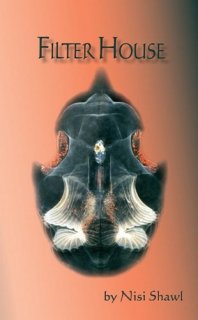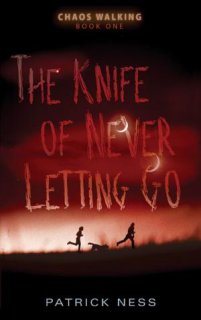
The Knife of Never Letting Go, a young adult novel by Patrick Ness, and Filter House, a short story collection by Nisi Shawl, were announced this past weekend as the winners of the 2008 Tiptree Award, an award for science fiction and fantasy which “expands or explores our understanding of gender.”
The James Tiptree, Jr. Literary Award Council discusses both winners and why they won in its official announcement.
Of The Knife of Never Letting Go, they write:
The Knife of Never Letting Go begins with a boy growing up in village way off the grid. Jury chair Gavin J. Grant explains, “All the villagers can hear one another’s thoughts (their ‘noise’) and all the villagers are men. The boy has never seen a woman or girl so when he meets one his world is infinitely expanded as he discovers the complications of gender relations. As he travels in this newly bi-gendered world, he also has to work out the definition of becoming and being a man.”
Juror Leslie Howle praises Ness’s skills as a writer: “Ness is a craftsman, plain and simple. The language, pacing, complications, plot this story has all of the elements that raise the writing to something well beyond good. Some critics call it brilliant. It’s a page-turner, and the story continues to resonate well after reading it. It reminds me of the kind of classic SF I loved when I was new to the genre.”
And of Filter House:
Publishers Weekly, which selected Filter House as one of the best books of 2008, described it as an “exquisitely rendered debut collection” that “ranges into the past and future to explore identity and belief in a dazzling variety of settings.” Tiptree jurors spotlight Shawl’s willingness to challenge the reader with her exploration of gender roles.
Juror K. Tempest Bradford writes, “The stories in Filter House refuse to allow the reader the comfort of assuming that the men and women will act according to the assumptions mainstream readers/society/culture puts on them.”
Juror Catherynne M. Valente notes that most of Shawl’s protagonists in this collection are young women coming to terms with womanhood and what that means “in terms of their culture, magic (almost always tribal, nuts and bolts, African-based magical systems, which is fascinating in itself), [and] technology.” In her comments, Valente points out some elements of stories that made this collection particularly appropriate for the Tiptree Award: “‘At the Huts of Ajala’ struck me deeply as a critique of beauty and coming of age rituals. The final story, ‘The Beads of Ku,’ deals with marriage and motherhood and death. ‘Shiomah’s Land’ deals with the sexuality of a godlike race, and a young woman’s liberation from it. ‘Wallamellon’ is a heartbreaking story about the Blue Lady, the folkloric figure invented by Florida orphans, and a young girl pursuing the Blue Lady straight into a kind of urban priestess-hood.”
The Tiptree Award has been presented every year since 1991 to work that is “thought-provoking, imaginative, and perhaps even infuriating” in exploring themes of gender. The awards will be officially presented to the winners at WisCon, May 22-25. Visit the official site for the very useful Honor List of other notable books dealing with these themes, as well as more information about the award itself.










